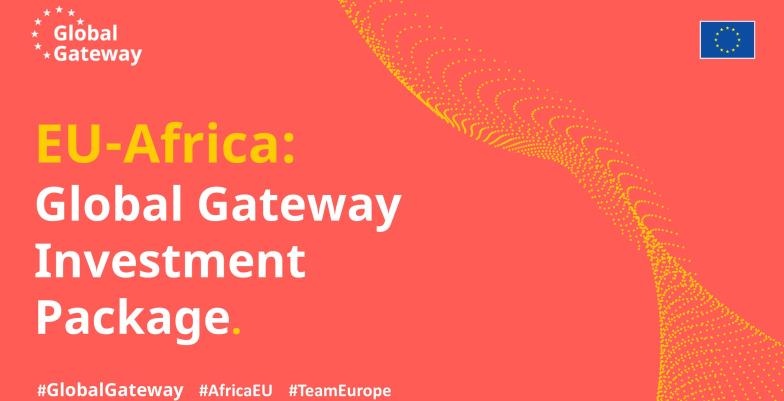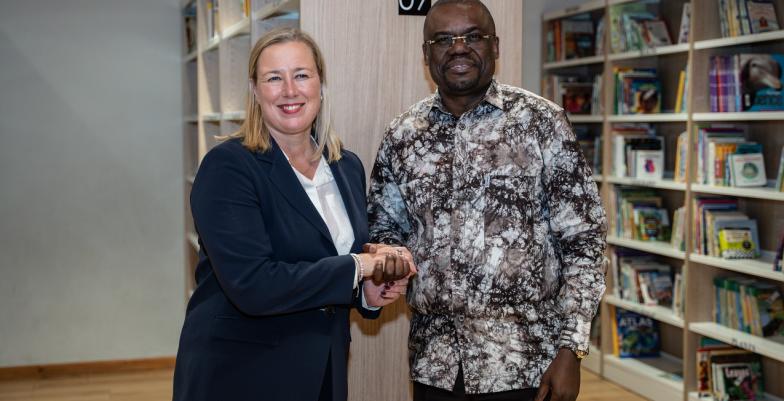RELATIONS WITH THE EU
The European Union and the African Union - Peace & Security
The European Union has been fully committed to Peace and Security issues in Africa for decades. As a reminder, and only via the African Peace Facility since 2004, this is a massive amount of 3,2 billion euros, which has been provided to support Africa continent insecurity. This unique support makes the EU a privileged partner for the African Union but also for the regional level. In face of increasing global instability, the EU remains committed to strengthening its ability to act as a global security provider.
Common objectives
Peace and Security thematic is part of all high-level political dialogues between the EU and the AU and is becoming an increasing portfolio in which the EU stands as a specific strategic partner.
The partnership between the African and European Union and their Member States aims at building a peaceful, safe, and secure environment, which fosters:
- Human security.
- Political stability.
- Effective governance.
- Sustainable and inclusive growth.
The AU - EU summit in Abidjan of November 2017 confirmed that Africa and EU face common security threats, which have an impact on the stability of our two continents.
Memorandum of Understanding (MoU) on Peace, Security and Governance
An AU-EU Memorandum of Understanding was signed in May 2018 to provide a solid and structured basis for the two Unions' partnership on peace and security.
Through the MoU, the AU and the EU envisage to promote an integrated approach to conflicts and crises through the better use of joint strategies and of early warning systems, focusing on fragility, human security, human rights, and recognising the need for increased coherence and greater synergies between development, humanitarian, governance and peace-building activities.
Specifically, the MoU intends to:
- Ensure the regular exchange of information.
- Foster closer cooperation and coordination of activities.
- Promote the development and implementation of joint activities.
- Facilitate coordination and enhance cooperation between the AU, EU and UN and its agencies, as well as other relevant international organizations.
As part of the implementation of the MoU, it is foreseen to hold yearly Ministerial meetings and to hold regular consultations at Senior Officials level twice a year.
EU PSC and AU PSC Cooperation
Cooperation between the EU Political and Security Committee (EU PSC) and the AU Peace and Security Council (AU PSC) is a key element of the AU-EU peace and security dialogue. The objective is to address international issues, reach common positions and implement joint approaches on challenges to peace and security of common interest to Africa and Europe.
The EU PSC and AU PSC meet on an annual basis in Brussels or in Addis Ababa. The Permanent Chair of the EU PSC and the monthly Chair of the AU PSC are in regular contact and their teams ensure the flow of information between the two organisations.
EU Funding tools
On 13 June 2018, former High Representative of the Union for Foreign Affairs and Security Policy (HR/VP) Federica Mogherini presented a proposal for a European Peace Facility (EPF), a new instrument designed to allow the financing of all Common Foreign and Security Policy (CFSP) external action with military and defence implications. This new tool replaces the African peace Facility and will focus especially on the military component of the Peace Support Operations. It takes effect as of the 1st of July 2021.
The facility will run alongside the Multiannual Financial Framework (MFF) for the 2021-2027 period. The EPF and the Neighbourhood, Development and International Cooperation Instrument, which is part of the 2021-2027 MFF, will together finance the bulk of EU external action in the field of peace and security cooperation. The Council has called for close and regular coordination between the Council, the EEAS and the Commission, to ensure complementarity and to avoid duplication or gaps, in particular between the Global Europe Instrument and the EPF.
African Peace and Security Architecture (APSA)
The African Peace and Security Architecture (APSA) of the AU is a rules-based mechanism that provides the necessary political oversight, legitimacy and legal foundation for interventions in Peace and Security to take place. The EU is the leading supporter of APSA.
In response to a request by African leaders, the APF was created in 2004 as an innovative instrument which provides the main source of funding to support APSA. Substantial EU funding has been committed under the APF to support a range of actions including:
- Peace support operations.
- Capacity building.
- Conflict prevention.
Conflicts in Africa have a detrimental impact on development efforts. Against this background, African Heads of State and Government set up the African Peace and Security Architecture (APSA). The APSA provides a comprehensive continental framework within which the African Union Commission (AUC), the Regional Economic Communities (RECs) and Regional Mechanisms (RMs) contribute to prevent, manage and resolve conflicts in Africa. The African Peace and Security Architecture is composed of five pillars. The five pillars of APSA are the Peace and Security Council (PSC), the Continental Early Warning System (CEWS), the Panel of the Wise, (iv) the African Standby Force (ASF) and the African Peace Fund (APF).
All these actions work towards the AU objective of the “Silencing the Guns” ambitious program in Africa.
Peace Support Operations
In addition to capacity building, the EU is massively supporting the African Peace Support Operations, whatever they are AU led (Amisom) or/and AU authorized (G5 Force, MNJTF, CTSAMVM, ECOMIG…). The support to PSOs can therefore be directed to the AU, to the RECs/REMs, to ad hoc coalitions. Within the APF envelope, this support was paramount and covered the biggest part of the overall budget dedicated to Peace and Security.
Counter Terrorism and Organised Crime
Africa and Europe are increasing their cooperation to address issues of common concern, such as:
- Terrorism and related threats.
- Transnational organised crime including trafficking of human beings, drugs and weapons.
- The illegal trade in wildlife.
The EU provides capacity building assistance to the AU to address all these areas.
Maritime Security
The EU, AU and their respective Member States are developing a coordinated approach to the issue of maritime security including counter-piracy efforts, and the fight against illegal, unregulated and unreported fishing. These actions are carried out under the African Integrated Maritime Strategy 2050 and the EU Integrated Maritime Policy.
The AU-EU Maritime Ministerial Meeting which took place in the Seychelles at the end of 2015 helped to raise awareness of threats posed by criminality at sea.
IGAD (Intergovernmental Authority on Development)
The EU Trust Fund project “IGAD Promoting Peace and Stability in the Horn of Africa Region (IPPSHAR)” is implemented in joint programming with the Austrian Development Agency (ADA) and the Netherlands and Swedish International Development Cooperation Agency, and it aims at achieving sustainable peace, security and stability for the attainment of economic integration and development of the IGAD region. This programme includes also the EU direct support to the human resources of the IGAD P&S Division for 2021-2022.
IPPSHAR focuses on enhancing capabilities that include conflict early warning and response, preventive diplomacy and mediation, peace processes in Somalia and South Sudan, tackling the transnational security threats, and enhancing the implementation effectiveness of the systems and structures.








